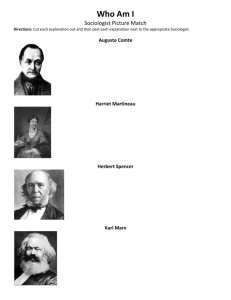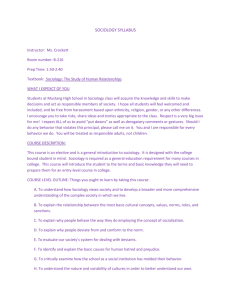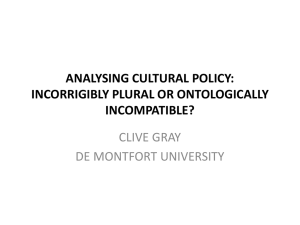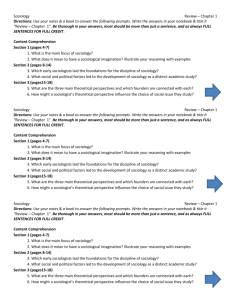Word - TASA
advertisement
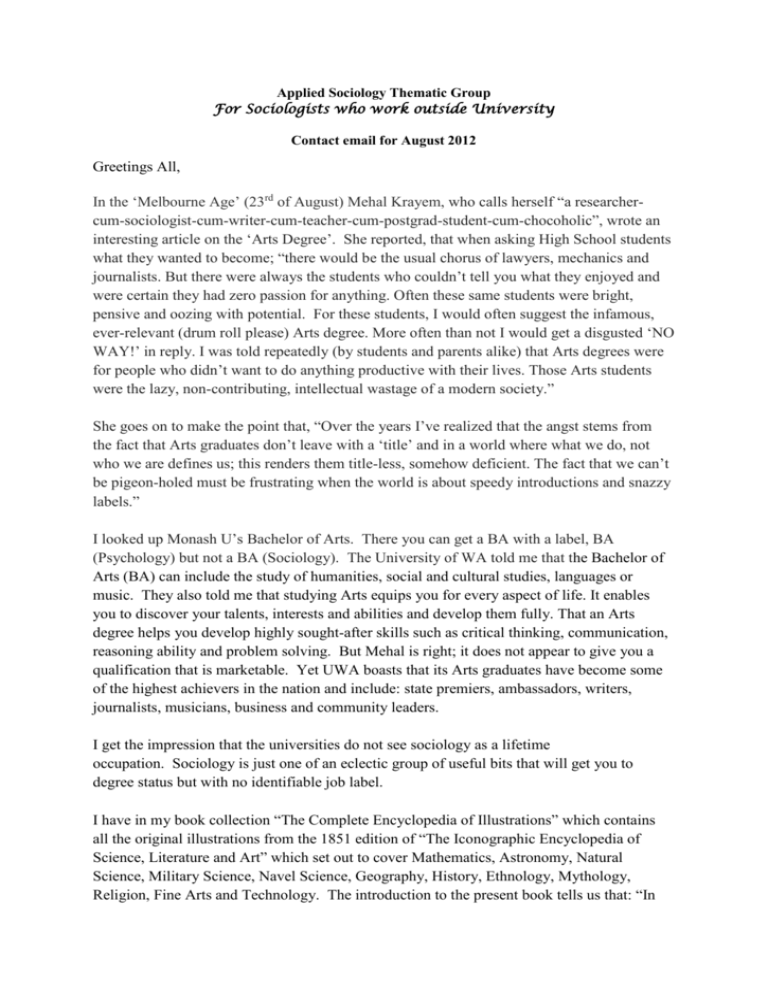
Applied Sociology Thematic Group For Sociologists who work outside University Contact email for August 2012 Greetings All, In the ‘Melbourne Age’ (23rd of August) Mehal Krayem, who calls herself “a researchercum-sociologist-cum-writer-cum-teacher-cum-postgrad-student-cum-chocoholic”, wrote an interesting article on the ‘Arts Degree’. She reported, that when asking High School students what they wanted to become; “there would be the usual chorus of lawyers, mechanics and journalists. But there were always the students who couldn’t tell you what they enjoyed and were certain they had zero passion for anything. Often these same students were bright, pensive and oozing with potential. For these students, I would often suggest the infamous, ever-relevant (drum roll please) Arts degree. More often than not I would get a disgusted ‘NO WAY!’ in reply. I was told repeatedly (by students and parents alike) that Arts degrees were for people who didn’t want to do anything productive with their lives. Those Arts students were the lazy, non-contributing, intellectual wastage of a modern society.” She goes on to make the point that, “Over the years I’ve realized that the angst stems from the fact that Arts graduates don’t leave with a ‘title’ and in a world where what we do, not who we are defines us; this renders them title-less, somehow deficient. The fact that we can’t be pigeon-holed must be frustrating when the world is about speedy introductions and snazzy labels.” I looked up Monash U’s Bachelor of Arts. There you can get a BA with a label, BA (Psychology) but not a BA (Sociology). The University of WA told me that the Bachelor of Arts (BA) can include the study of humanities, social and cultural studies, languages or music. They also told me that studying Arts equips you for every aspect of life. It enables you to discover your talents, interests and abilities and develop them fully. That an Arts degree helps you develop highly sought-after skills such as critical thinking, communication, reasoning ability and problem solving. But Mehal is right; it does not appear to give you a qualification that is marketable. Yet UWA boasts that its Arts graduates have become some of the highest achievers in the nation and include: state premiers, ambassadors, writers, journalists, musicians, business and community leaders. I get the impression that the universities do not see sociology as a lifetime occupation. Sociology is just one of an eclectic group of useful bits that will get you to degree status but with no identifiable job label. I have in my book collection “The Complete Encyclopedia of Illustrations” which contains all the original illustrations from the 1851 edition of “The Iconographic Encyclopedia of Science, Literature and Art” which set out to cover Mathematics, Astronomy, Natural Science, Military Science, Navel Science, Geography, History, Ethnology, Mythology, Religion, Fine Arts and Technology. The introduction to the present book tells us that: “In the mid-nineteenth century, a man (their sexist identification) was not considered fully educated unless he had a broad, deep and detailed knowledge of all areas of culture and human endeavour. This was expected to include a solid grounding in the scientific disciplines, an appreciation of art in all its manifestations, a store of mythological references and tales, considerable knowledge of geological wonders and oddities, plus a curiosity about technological developments.” Later development in the 19th and 20th centuries invented ‘specialisation’. A broad education was no longer required. I can remember when organisations coming from the 19th century, such as ANZAAS, held an annual conference where all the disciplines came together and people could get insights into their own discipline by listening to presentations from others. Then, in the early 1980s the universities decreed that they would only fund attendance at conferences in one’s own discipline and organisation like ANZAAS died. It seems to me that the Arts degree, at least in some places, is a left over from the 19th century and that sociology (together with other disciplines) is reduced to being just one of a number of possible useful areas that can be added together to give degree status to the broadly educated person, but not the perceived detailed skills that are expected in employable people. So where does the Applied Sociologist get their identifiable skills for employment and a community recognition that a sociologist has skills, needed and usable by society? At the moment it seems only by dint of their own efforts. When will we see a BA (Sociology) or indeed a B. Soc? Alan Scott Convenor





